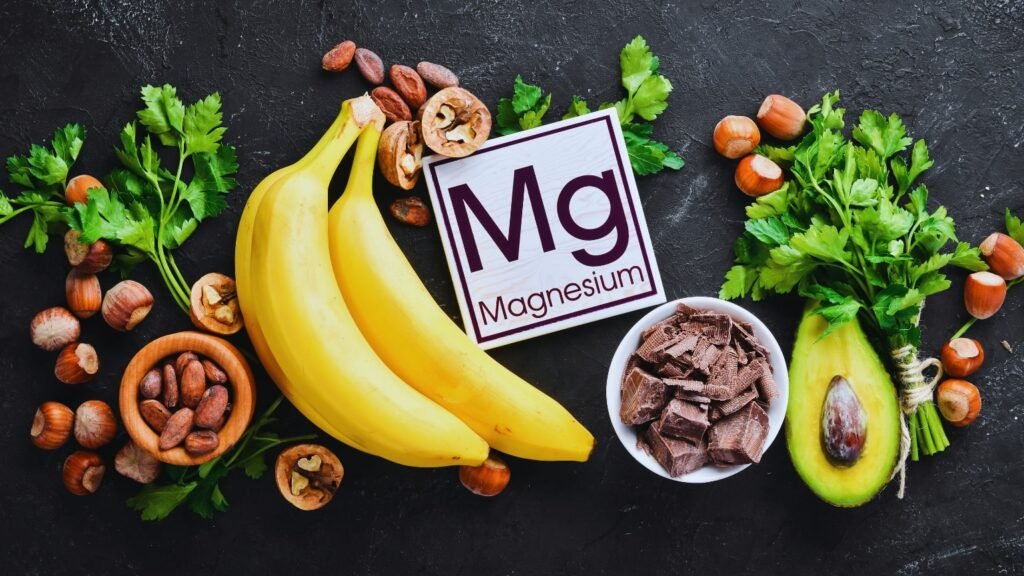
In the realm of essential minerals, magnesium stands as an unsung hero, quietly orchestrating a multitude of vital functions within our bodies. This in-depth article delves into the extraordinary health benefits of magnesium. From its role in cardiovascular health to its impact on muscle function and mental well-being, magnesium is a mineral that deserves the spotlight. By the end of this journey, you’ll have a profound appreciation for magnesium and how it contributes to your overall health.
Magnesium Uses In The Body
Magnesium is one of the most abundant minerals in the human body, second only to calcium. It is involved in over 300 enzymatic reactions, where it acts as a cofactor, supporting various biochemical processes. This mineral is crucial for muscle contraction, nerve transmission, and maintaining a steady heartbeat. It also plays a pivotal role in bone health, DNA synthesis, and the body’s antioxidant defence system.
Magnesium for Heart Health
Magnesium is a crucial mineral when it comes to maintaining optimal heart health. It plays a multifaceted role in supporting the cardiovascular system. Firstly, magnesium helps regulate the heartbeat by influencing the electrical impulses that control it. This, in turn, contributes to the steady rhythm of the heart, reducing the risk of arrhythmias.
Additionally, magnesium aids in relaxing the blood vessels, promoting vasodilation. This process leads to improved blood flow and reduced resistance within the arteries, ultimately supporting healthy blood pressure levels. By preventing hypertension, magnesium lowers the risk of heart diseases, including heart attacks and strokes. Moreover, magnesium offers protection against arterial calcification, which can reduce the likelihood of atherosclerosis, a condition involving the hardening of the arteries.
Furthermore, magnesium is a vital component in energy production at the cellular level, including within heart cells. It helps generate adenosine triphosphate (ATP), the primary energy currency of cells. This energy production is particularly crucial for the heart, as it continuously pumps blood throughout the body. When magnesium levels are adequate, the heart can function optimally, and its workload is efficiently managed.
Magnesium for Bone Health
Magnesium is an often-overlooked but essential mineral for maintaining strong and healthy bones. While calcium typically takes the spotlight in discussions about bone health, magnesium plays an equally critical role. Approximately 60% of the body’s magnesium is stored in the bones, where it helps to regulate calcium levels and bone density. Magnesium is involved in the activation of vitamin D, which, in turn, enhances calcium absorption in the intestines. Without sufficient magnesium, calcium may not be properly utilized, leading to weakened bones.
Furthermore, magnesium influences bone health by participating in bone-forming processes. It aids in the conversion of vitamin D into its active form, which is necessary for calcium absorption. Magnesium also stimulates the production of osteoblasts, the cells responsible for bone mineralization. This dual role of magnesium in calcium regulation and bone metabolism makes it a crucial element in preventing osteoporosis and maintaining overall bone integrity. Ensuring an adequate intake of magnesium through diet or supplements can contribute significantly to preserving bone health, especially as individuals age and face an increased risk of bone-related conditions.
Magnesium for Muscle Function
Magnesium plays a fundamental role in muscle function, making it a crucial mineral for overall physical performance and well-being. One of its primary functions is in muscle contraction and relaxation. When you engage in any physical activity, whether it’s a simple task like lifting a cup or an intense workout, magnesium is required for your muscles to contract and then relax afterward. This process is governed by the balance of calcium and magnesium ions within muscle cells. Calcium triggers muscle contractions, while magnesium counters this action by promoting muscle relaxation. This intricate interplay between the two minerals ensures that your muscles function smoothly and efficiently.
Furthermore, magnesium helps reduce the risk of muscle cramps and spasms. Insufficient magnesium levels can lead to muscle twitches, cramps, and spasms, which can be both uncomfortable and limiting, particularly for athletes and active individuals. By maintaining an adequate magnesium intake, you can support proper muscle function and reduce the likelihood of experiencing these bothersome muscle issues. Athletes, in particular, may benefit from magnesium supplementation to optimize muscle performance and recovery, as rigorous physical activity can increase the body’s magnesium requirements.
Magnesium for Mental Well-being
Magnesium, often referred to as the “anti-stress” mineral, plays a significant role in promoting mental well-being and alleviating symptoms of stress and anxiety. This essential mineral participates in numerous biochemical reactions in the brain, influencing neurotransmitter activity and helping to regulate mood. Magnesium helps maintain optimal levels of gamma-aminobutyric acid (GABA), a neurotransmitter known for its calming and relaxing effects on the brain. Adequate GABA levels can help reduce feelings of anxiety and stress, promoting an overall sense of mental tranquility.
Additionally, magnesium may play a role in preventing and managing mood disorders such as depression. Research suggests that magnesium deficiency may be linked to an increased risk of depression, and supplementation with magnesium has shown promise in improving depressive symptoms. While the exact mechanisms are still being explored, it is believed that magnesium’s impact on brain function, neurotransmitter regulation, and the body’s stress response system all contribute to its positive effects on mental well-being.
Magnesium for Energy Production
Magnesium is a crucial player in the body’s energy production processes. It participates in the activation of adenosine triphosphate (ATP), which is often referred to as the body’s “energy currency.” When you consume food, your body converts it into ATP, which fuels various cellular processes, including muscle contraction, enzyme activity, and nerve function. Magnesium acts as a cofactor for enzymes involved in ATP production, ensuring that this energy is readily available for your cells to use. In simple terms, without sufficient magnesium, your body’s ability to generate and utilize energy effectively can be compromised.
Furthermore, magnesium plays a vital role in muscle function, which is directly linked to energy production. Adequate magnesium levels are essential for proper muscle contraction and relaxation. During physical activity, especially intense exercise, muscles require more energy, and magnesium helps facilitate this process. It also aids in the removal of lactic acid, a byproduct of muscle metabolism, which can contribute to muscle fatigue. Therefore, maintaining optimal magnesium levels is essential for sustaining energy levels, preventing muscle cramps, and enhancing overall physical performance. Whether you’re an athlete or simply looking to boost your everyday energy, ensuring an adequate intake of magnesium-rich foods can contribute to improved vitality and stamina.
Magnesium for Blood Sugar Control
Magnesium plays a significant role in regulating blood sugar levels and maintaining overall metabolic health. It acts as a cofactor for enzymes involved in glucose metabolism, enabling cells to take up glucose from the bloodstream effectively. Magnesium also supports insulin function, which is crucial for the control of blood sugar. Insulin is a hormone produced by the pancreas that helps transport glucose into cells for energy. Without sufficient magnesium, insulin may not work as efficiently, leading to insulin resistance, a condition where the body’s cells don’t respond well to insulin’s signals. This can result in elevated blood sugar levels, a hallmark of diabetes.
Research has shown that magnesium supplementation can improve insulin sensitivity and reduce the risk of developing type 2 diabetes. Additionally, for those already diagnosed with diabetes, magnesium may help in better blood sugar control. A diet rich in magnesium-containing foods, such as leafy greens, nuts, and whole grains, can contribute to improved blood sugar management and reduce the risk of diabetes-related complications.
Magnesium for Migraine Relief
Magnesium has emerged as a promising natural remedy for migraine relief and prevention. Migraines are debilitating headaches often accompanied by symptoms like nausea, vomiting, and sensitivity to light and sound. Research suggests that magnesium’s role in migraine management is linked to its ability to relax blood vessels and mitigate neurological changes associated with migraine attacks.
Several studies have demonstrated that individuals who experience migraines often have lower levels of magnesium in their blood. Magnesium supplementation has been shown to reduce the frequency and severity of migraine attacks in some individuals. It is believed that magnesium helps by stabilizing blood vessels in the brain and reducing the release of certain neurotransmitters involved in migraine pathophysiology. While magnesium alone may not be a universal cure for migraines, it can be a valuable addition to migraine management strategies, particularly for individuals with magnesium deficiency.
To potentially alleviate migraines, individuals can consider incorporating magnesium-rich foods like nuts, seeds, leafy greens, and whole grains into their diet. For those with chronic migraines or identified magnesium deficiencies, consulting with a healthcare professional about magnesium supplementation can be a proactive step in their migraine management plan. However, it’s important to note that the effectiveness of magnesium in migraine relief can vary among individuals, and personalized treatment approaches should be explored in consultation with a healthcare provider.
Anti-inflammatory Effects of Magnesium
Magnesium, an essential mineral, offers valuable anti-inflammatory effects in the body. Firstly, magnesium helps regulate the production of cytokines, which are signaling molecules involved in the immune response. By modulating cytokine production, magnesium assists in preventing excessive inflammation and maintaining a balanced immune system. This anti-inflammatory function can contribute to a reduced risk of chronic inflammatory conditions.
Secondly, magnesium serves as a natural calcium antagonist, regulating calcium levels within cells. Excess calcium can trigger inflammation and oxidative stress. Magnesium’s role in balancing calcium’s functions in various cellular processes further enhances its anti-inflammatory properties.
Now that we’ve explored the myriad health benefits of magnesium, let’s delve into the best dietary sources to ensure you’re getting an ample supply of this vital mineral.
Dietary Sources of Magnesium
Leafy Green Vegetables
Leafy greens like spinach, kale, and Swiss chard are excellent sources of magnesium. They are also rich in other essential nutrients and fiber, making them an essential component of a healthy diet.
Nuts and Seeds
Almonds, cashews, pumpkin seeds, and sunflower seeds are packed with magnesium. They make for a convenient and delicious snack or can be sprinkled over salads and yogurt.
Whole Grains
Whole grains like brown rice, quinoa, and oats are not only a good source of fiber but also provide significant amounts of magnesium. They can be used as the base for hearty and nutritious meals.
Legumes
Beans, lentils, and peas are magnesium-rich legumes that offer a plant-based source of protein along with other essential nutrients. They are versatile ingredients for soups, stews, and salads.
Seafood
Fatty fish like salmon and mackerel are not only rich in omega-3 fatty acids but also provide a decent amount of magnesium. Incorporating fish into your diet can be a flavorful way to boost your magnesium intake.
Avocado
Avocado is a unique fruit that is a good source of magnesium. It’s also rich in healthy fats, fiber, and various vitamins, making it a nutritious addition to your meals or snacks.
Dark Chocolate
For those with a sweet tooth, dark chocolate (with a cocoa content of 70% or higher) is a surprisingly good source of magnesium. Enjoy it in moderation for a magnesium-rich treat.
Bananas
Bananas are not only a portable and nutritious snack but also provide a decent amount of magnesium. They are an excellent choice for a quick energy boost.
Dairy Products
Dairy products like yogurt and milk contain magnesium, calcium, and vitamin D, making them a great choice for supporting bone health.
Tofu
Tofu, a staple in vegetarian and vegan diets, is a valuable source of magnesium. It’s a versatile ingredient that can be used in savory and sweet dishes.
Figs
Dried figs are a concentrated source of magnesium and can be enjoyed as a wholesome snack or added to cereals and baked goods.
Black beans, a staple in many cuisines, are rich in magnesium and fiber. They can be used in a wide range of savory dishes, from tacos to salads.
Whole Wheat Bread
Opt for whole wheat bread over refined white bread to increase your magnesium intake. It’s not only more nutritious but also a good source of dietary fiber.
Brown Rice
Switching from white rice to brown rice is a simple way to add more magnesium to your diet. It’s a versatile side dish for various meals.
Supplements
If you have difficulty meeting your magnesium needs through diet alone, magnesium supplements are available. However, it’s essential to consult with a healthcare professional before taking supplements to determine the right dosage for your individual needs.
While magnesium supplements offer potential advantages, concerns have arisen regarding their overuse and potential side effects. Excessive magnesium intake can lead to diarrhea, stomach cramps, and nausea. This has prompted discussions about whether supplements are necessary for individuals with balanced diets.
Experts argue that most people can meet their magnesium needs through a well-balanced diet. Leafy greens, nuts, seeds, whole grains, and other natural sources provide a rich and diverse magnesium supply. The body often absorbs magnesium from food more efficiently than from supplements, which raises questions about the necessity of supplementation for individuals without specific health concerns.
How Much Magnesium to Take a Day?
The controversy surrounding magnesium also extends to determining the optimal daily intake. Recommended dietary allowances (RDAs) vary by age, gender, and life stage. Exceeding the upper intake level (UL) can lead to adverse effects, including gastrointestinal discomfort and, in rare cases, magnesium toxicity.
Buy Nuts Singapore
Are you looking to boost your magnesium intake while enjoying a delicious and wholesome snack? Look no further than nuts! Our premium selection of nuts provides you with a convenient and nutritious way to increase your magnesium levels. Whether you prefer the creamy richness of almonds, the crunch of walnuts, or the earthy flavour of cashews, our wide variety of nuts ensures there’s something to satisfy every palate. So, why not make a smart choice for your health and indulge in a handful of nuts today? Your body will thank you, and your taste buds will rejoice in the process!
Conclusion
Magnesium is truly a powerhouse mineral, orchestrating numerous essential functions in the body. From heart health to muscle function, mental well-being, and beyond, magnesium’s contributions to our overall health cannot be overstated. Ensuring an adequate intake of magnesium-rich foods is a wise choice for maintaining wellness and vitality.
The controversy surrounding magnesium consumption underscores the importance of a balanced approach to nutrition and supplementation. While magnesium undeniably offers a plethora of health benefits, indiscriminate supplementation may not be the best path for everyone. Individuals should strive to meet their magnesium needs through a well-rounded diet rich in natural sources while considering supplements when necessary, under the guidance of a healthcare professional.
So, go ahead and savour those leafy greens, nuts, and dark chocolate, knowing that you’re nourishing your body with the incredible benefits of magnesium.






